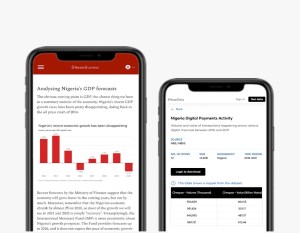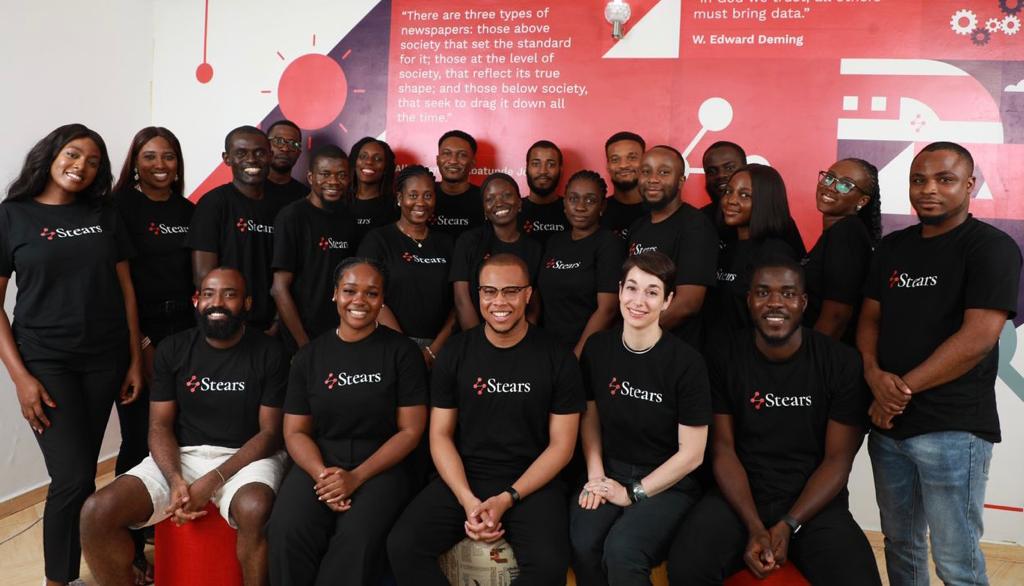While studying at the London School of Economics and the University of Oxford, a group of graduates noticed how difficult it was to get data and information on Africa’s largest economy and their home country, Nigeria. Each had different yet complementary skills — Michael Famoroti, an economist; Bode Ogunlana, a software engineer; Abdul Abdulrahim, a data scientist; and Preston Ideh, a corporate lawyer — and in 2017, they launched a media startup to address the dearth of information and data-driven insights in the West African country.
Five years on, this startup, Stears, is announcing a $3.3 million seed round led by MaC Venture Capital. Serena Ventures, Omidyar Group’s Luminate Fund, Melo 7 Tech Partners and Cascador (Empowering Economic Growth Foundation) participated. This news is coming two years after Stears raised $650,000 in pre-seed funding. Last month, it was one of the 60 startups to get accepted into the Google for Startups Black Founders Fund 2022 cohort, which included some non-dilutive funding.
Stears started as a media publication focused on financial news and insights in Nigeria. Its flagship subscription insights product, Stears Premium, contains content ranging from news and opinion pieces to investigative pieces and deep dives, educating the general public on issues around business and finance, economy, government and policy in Nigeria. The $100-a-year product witnessed significant usage among consumers, particularly employees working in various finance-related institutions across the country. And because these institutions have more spending power, Stears subsequently tailored the product to businesses who wanted to subscribe on behalf of their teams. Some of its subscribers include financial institutions like Sterling Bank, and fintechs like Sparkle, PiggyVest and Paystack. The company says its userbase has grown mainly organically at around 6.5% month-on-month, doubling its total number of users over the last year.
“We have a strong understanding of the kind of information people need. So our focus is on standardizing information dissemination and building with the customer in mind,” Ideh told TechCrunch in an interview. “An essential part of our business model is pushing out high-value subscription data products, for instance, proprietary forecast models. Conversely, the low-value end will be news, so customers’ willingness to spend changes as they go along the spectrum.”
The iteration of Stears Premium, alongside the introduction of other products Stears Pro and Stears Advisory, has seen Stears morph into a data and intelligence company. Macro trends and topics like GDP and inflation drive content on Stears Premium. Stears Pro, on the other hand, provides more bespoke content around specific issues such as market entry, country analysis and digital economy for international organizations such as the United Nations Development Programme, the Foreign Commonwealth and Development Office and the knowledge workers—people need a great deal of data for their work, which may include roles such as analysts, portfolio managers, researchers and economists—that work in them.
But in a bid to support its transition from an insights company to a data company and buoyed by this new investment, Stears is planning a strategy modification for the Pro product. According to the company’s COO and data scientist Abdulrahim, the data outfit is working with international development institutions and financial institutions to produce proprietary and exclusive datasets that don’t exist anywhere else. Therefore, instead of reporting insights from the data it sources, Stears wants to collate data, engage in deep data analytics and present it to its business customers in various formats.
“An essential part of our business model is pushing out high-value subscription data products. And as we advance, we’ll do less custom work for this set of customers and focus more on overall data around the same sector,” added Ideh, on the direction Stears is taking with its Pro product. “So the difference in output is such that in the past, we put out reports, but in the future, we’re probably going to put out data feeds. So less text-heavy way of publishing and more of forecast and prediction around sectors that matter to knowledge workers and their organizations.”
Stears Advisory — the product where Stears wears its consultancy hat and takes on third-party projects around its core coverage — is taking a rear seat as the company intends to double down on Pro and Premium. CEO Ideh explained that while the Advisory product, which he likens to a research and development (R&D) arm sponsored by different partners, allows Stears to experiment with data collection and analysis and provides the bedrock to carve out further insights, it’s not scalable and lacks the sort of recurring revenue that venture-backed businesses need.

So far, the company’s strategy seems to be paying off. Enterprise customers now contribute over 75% of revenues generated, up from 45% in 2021. It also expects revenues to double from last year as half-year revenues for 2022 have already surpassed full-year revenues for 2021. This is compared to the 80% revenue growth between FY 2021 and FY 2020.
As a data and intelligence company, Stears finds itself in a sweet spot where it is incentivized to pursue political projects that would draw attention if it were a media or tech company. In 2019, the company embarked on one such project as it developed Nigeria’s first real-time election database. Over 2 million Nigerians used it to monitor the general elections. Ideh said his company intends to relaunch the election data site, this time with more datasets and functionalities, in anticipation of Nigeria’s 2023 elections.
“Bloomberg, at its core, is a data company; we love how they approach elections and our approach in 2019 was driven by them,” said Ideh, who has always been vocal about Stears building the Bloomberg of Africa. “This is a big open data effort for us and we are also excited about polling because it is a very important form of data verification currently missing in Nigeria. And so over the election period, we will run and push out statistically representative polls on Nigeria, using strong data mindsets, to get a sense of public opinion issues and achieve more robust results.”
According to Ideh, the seed investment will take Stears from a v2.0, a Nigerian insight company, to a v3.0, a data company focused on Africa. The company plans to use the investment to enhance its data collection and analytics capabilities, hire data scientists, data analysts and sector analysts, and expand to east Africa through Kenya, southern Africa through the eponymous country and north Africa through Egypt.
“Africa is home to the first humans and is now the next frontier for business,” said Marlon Nichols, co-founder and managing general partner at lead investor MaC Venture Capital on the investment. “Many multinational corporations and governments understand this to be a reality. They also appreciate that several African countries are subject to unique business processes and are primarily cash-based economies, which results in understated GDP, among other things. Stears is uniquely positioned to provide the proprietary and accurate data needed to unlock trade and deeper business relationships with African countries and companies.”































Comment